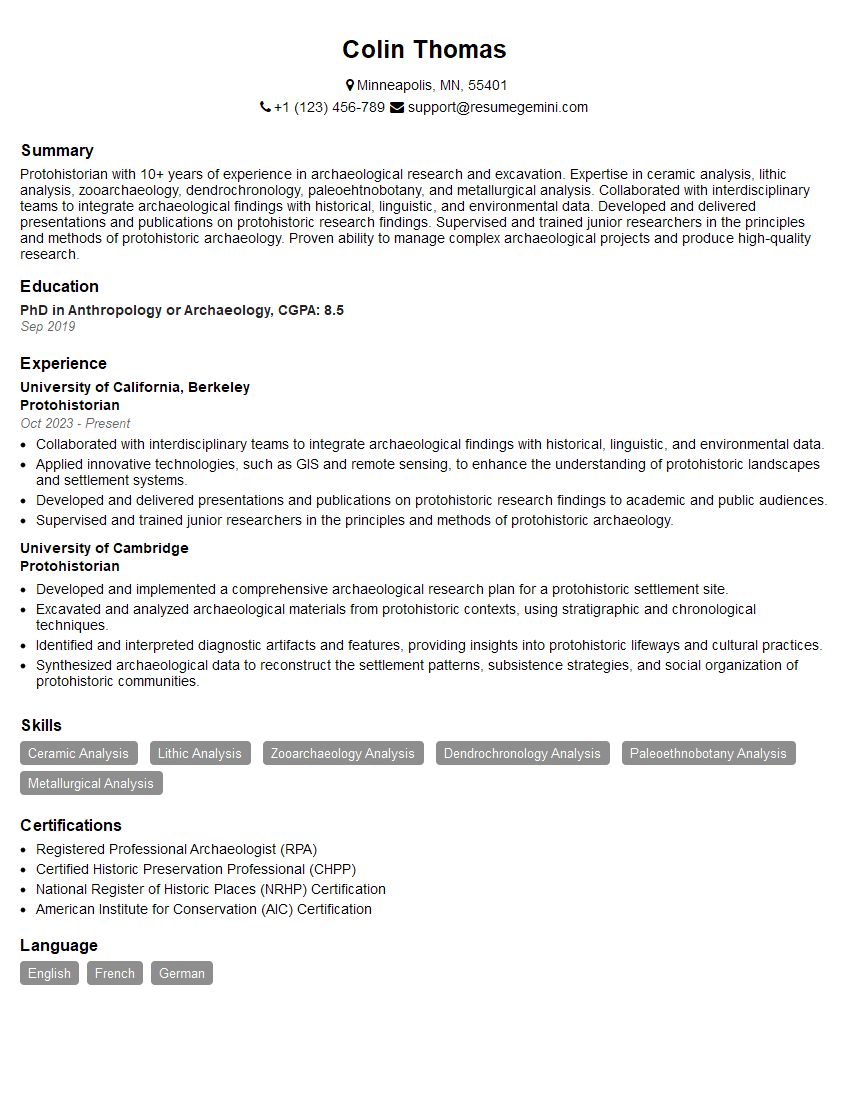Are you a seasoned Protohistorian seeking a new career path? Discover our professionally built Protohistorian Resume Template. This time-saving tool provides a solid foundation for your job search. Simply click “Edit Resume” to customize it with your unique experiences and achievements. Customize fonts and colors to match your personal style and increase your chances of landing your dream job. Explore more Resume Templates for additional options.

Colin Thomas
Protohistorian
Summary
Protohistorian with 10+ years of experience in archaeological research and excavation. Expertise in ceramic analysis, lithic analysis, zooarchaeology, dendrochronology, paleoehtnobotany, and metallurgical analysis. Collaborated with interdisciplinary teams to integrate archaeological findings with historical, linguistic, and environmental data. Developed and delivered presentations and publications on protohistoric research findings. Supervised and trained junior researchers in the principles and methods of protohistoric archaeology. Proven ability to manage complex archaeological projects and produce high-quality research.
Education
PhD in Anthropology or Archaeology
September 2019
Skills
- Ceramic Analysis
- Lithic Analysis
- Zooarchaeology Analysis
- Dendrochronology Analysis
- Paleoethnobotany Analysis
- Metallurgical Analysis
Work Experience
Protohistorian
- Collaborated with interdisciplinary teams to integrate archaeological findings with historical, linguistic, and environmental data.
- Applied innovative technologies, such as GIS and remote sensing, to enhance the understanding of protohistoric landscapes and settlement systems.
- Developed and delivered presentations and publications on protohistoric research findings to academic and public audiences.
- Supervised and trained junior researchers in the principles and methods of protohistoric archaeology.
Protohistorian
- Developed and implemented a comprehensive archaeological research plan for a protohistoric settlement site.
- Excavated and analyzed archaeological materials from protohistoric contexts, using stratigraphic and chronological techniques.
- Identified and interpreted diagnostic artifacts and features, providing insights into protohistoric lifeways and cultural practices.
- Synthesized archaeological data to reconstruct the settlement patterns, subsistence strategies, and social organization of protohistoric communities.
Certificates
- Registered Professional Archaeologist (RPA)
- Certified Historic Preservation Professional (CHPP)
- National Register of Historic Places (NRHP) Certification
- American Institute for Conservation (AIC) Certification
Languages
- English
- French
- German
Career Expert Tips:
- Select the ideal resume template to showcase your professional experience effectively.
- Master the art of resume writing to highlight your unique qualifications and achievements.
- Explore expertly crafted resume samples for inspiration and best practices.
- Build your best resume for free this new year with ResumeGemini. Enjoy exclusive discounts on ATS optimized resume templates.
How To Write Resume For Protohistorian
- Highlight your experience in protohistoric archaeology and related fields.
- Showcase your expertise in various archaeological analysis techniques.
- Quantify your accomplishments and provide specific examples of your research findings.
- Emphasize your ability to collaborate with interdisciplinary teams.
- Demonstrate your strong communication and presentation skills.
Essential Experience Highlights for a Strong Protohistorian Resume
- Develop and implement comprehensive archaeological research plans.
- Excavate and analyze archaeological materials using stratigraphic and chronological techniques.
- Identify and interpret diagnostic artifacts and features to reconstruct settlement patterns, subsistence strategies, and social organization.
- Collaborate with interdisciplinary teams to integrate archaeological findings with historical, linguistic, and environmental data.
- Apply innovative technologies, such as GIS and remote sensing, to enhance the understanding of protohistoric landscapes and settlement systems.
- Supervise and train junior researchers in the principles and methods of protohistoric archaeology
- Develop and deliver presentations and publications on protohistoric research findings to academic and public audiences.
Frequently Asked Questions (FAQ’s) For Protohistorian
What is the role of a Protohistorian?
A Protohistorian studies the transition from prehistory to history, focusing on periods where written records are limited or non-existent. They use archaeological methods to reconstruct past societies and cultures.
What are the key skills required for a Protohistorian?
Key skills include expertise in archaeological excavation and analysis techniques, knowledge of protohistoric cultures and periods, and strong research and communication skills.
What are the career prospects for a Protohistorian?
Protohistorians can work in academia, museums, government agencies, and cultural resource management firms. They may also pursue careers in research, teaching, or public outreach.
What are the educational requirements for a Protohistorian?
A PhD in Anthropology or Archaeology with a focus on protohistory is typically required. Additional training in archaeological methods and techniques is also beneficial.
What are the challenges faced by Protohistorians?
Challenges include working with limited written records, dealing with complex archaeological sites, and interpreting fragmentary evidence to reconstruct past cultures.
What are the rewards of being a Protohistorian?
Protohistorians have the opportunity to uncover new insights into human history, contribute to our understanding of past cultures, and preserve and interpret cultural heritage.